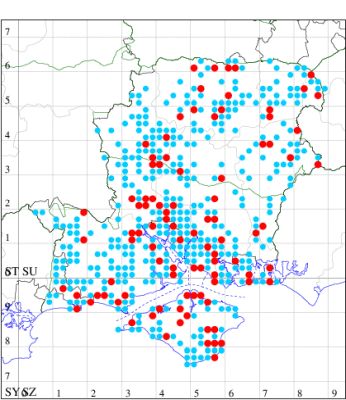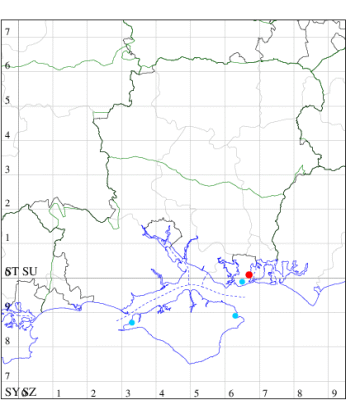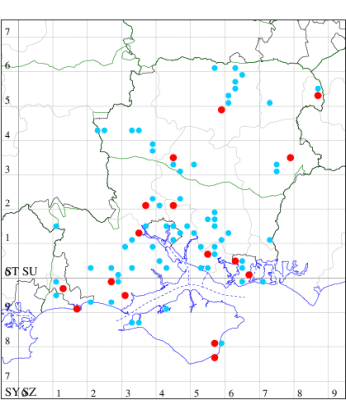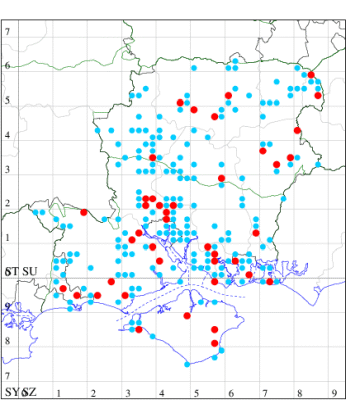2022 Annual Report for: Pyralidae / Galleriinae
For species seen in 2022 that had less than or equal to 100 records, full details are included; for more common species, the earliest, latest and highest count by vice-county are shown. The narrative for each species is taken from the main Hantsmoths website, and it is possible that some information on abundance and occurrence can get out of date, as it is impossible to keep up with all changes; however it should give a good introduction to each species. The tables in each species account summarise the previous status, and that for the current year.
For the maps, all records prior to 2022 are shown by a blue dot (the larger the dot, the more recent), with the current year's records shown in red. As previous records are superimposed on any report for 2022, new sites have greater emphasis (i.e. will show as 'more red').
In the species accounts, an asterisk next to a location indicates a new 10km square record; earliest ever dates are highlighted in orange, and latest ever in red. Initials in the species accounts refer to the recorders listed here. Please get in touch if you identify any omissions or errors, in particular if you have records that have yet to be submitted. Details of how to submit records can be found here.
62.001 [B&F: 1428] Bee Moth Aphomia sociella (Linnaeus, 1758) - Common
Common around bee and wasp nests and in beehives throughout Britain. Widespread and common in Hampshire and on the Isle of Wight. Wingspan 25-38 mm. Highly sexually dimorphic, the distinctive male is unmistakable, but the female is superficially similar to the much narrower-winged Melissoblaptes zelleri, a species confined to sandhills in a very few locations in south-eastern England. Larva feeds on the debris in, and contents of, wasp and bee nests.
Records prior to 2022
| Vice County | #Records | #Individuals | First Record | Last Record |
|---|---|---|---|---|
| 10 | 649 | 961 | 1856 | 2021 |
| 11 | 5317 | 7010 | 1951 | 2021 |
| 12 | 1977 | 3218 | 1951 | 2021 |
2022 records
| Vice County | #Records | #Individuals | Max Quantity |
|---|---|---|---|
| 10 | 85 | 150 | 16 |
| 11 | 245 | 323 | 5 |
| 12 | 86 | 126 | 10 |

Records by year
Records by week (adult)
Records by week (larval)
Record Summary
VC10: Earliest: Bonchurch, 09 May, 1 (JHa) Latest: Newport, 15 Aug, 1 (DPl) Max count: Osborne Wood, 23 Jun, 16 (IOu)
VC11: Earliest: Portchester, 11 Apr, 1 (DH-J) Latest: Stanbrige Earls, 12 Sep, 1 (JRM) Max count: Totton, 22 Jun, 5 (LHan)
VC12: Earliest: Teg Down, Winchester, 20 Apr, 1 (CKni) Latest: Teg Down, Winchester, 14 Aug, 1 (CKni) Max count: Alton, 26 May, 10 (DBO)
62.002 [B&F: 1429] Lamoria zelleri (Joannis, 1932) - Nationally Scarce A
Nationally scarce (Na) on sand-dunes and other dry sandy areas in parts of south-eastern England and East Anglia, predominantly coastal. Recorded for the first time in Hampshire at Southsea in 2010, and again nearbly in 2022. On the Isle of Wight, recorded in the past from St Helens (1909); a record from 2015 needs validation but is included in the below. Wingspan 20-37 mm. Narrower-winged than female Bee Moth Aphomia sociella, less brown, cross-lines less well-defined, discal spots less black and more even in size, and hindwing paler and more glossy; in female Stored Nut Moth Paralipsa gularis, which is smaller, first cross-line is defined and discal spot larger and more intense than corresponding spot in M. zelleri [Goater]. Larva feeds on various mosses, living within a silken tube or tent, buried in sand.
Records prior to 2022
| Vice County | #Records | #Individuals | First Record | Last Record |
|---|---|---|---|---|
| 10 | 3 | 1 | 1856 | 2015 |
| 11 | 1 | 1 | 2010 | 2010 |
2022 records
| Vice County | #Records | #Individuals | Max Quantity |
|---|---|---|---|
| 11 | 1 | 1 | 1 |

Records by year
Records by week (adult)
Records by week (larval)
Record Details
VC11: Portsmouth*, one, 13 Jul (IRT)
62.005 [B&F: 1426] Lesser Wax Moth Achroia grisella (Fabricius, 1794) - Local
Local throughout much of the British Isles, except for Scotland. Less common than previously due to improvements in bee-keeping practices. Most records originate from the southern third of Hampshire, particularly along the Test and Solent, and quite scarce in the north of the county; since 2010, recorded annually in the Isle of Wight where it was previously virtually unknown. Wingspan 16-24 mm. The characteristic shape, yellow head and absence of wing-markings facilitate identification [Goater]. Larva feeds on beeswax, dead insects and dried fruit; can be a pest of beehives.
Records prior to 2022
| Vice County | #Records | #Individuals | First Record | Last Record |
|---|---|---|---|---|
| 10 | 25 | 27 | 1952 | 2021 |
| 11 | 173 | 151 | 1951 | 2021 |
| 12 | 34 | 36 | 1951 | 2021 |
2022 records
| Vice County | #Records | #Individuals | Max Quantity |
|---|---|---|---|
| 10 | 4 | 4 | 1 |
| 11 | 21 | 24 | 2 |
| 12 | 4 | 4 | 1 |

Records by year
Records by week (adult)
Records by week (larval)
Record Details
VC10: Bonchurch, one, 15 Jul; one, 14 Aug (JHa); Shanklin, one, 06 Jul; one, 11 Jul (IOu);
VC11: Totton, one, 10 Jul; one, 11 Jul; one, 31 Jul; one, 20 Sep (LHan); Romsey, one, 12 Sep (KPea); Allbrook, one, 09 Jul (SIng); Catisfield, one, 31 Jul (ALR); Portchester, one, 26 Jun; two, 07 Jul; one, 11 Aug (DH-J); Portsmouth, one, 13 Jul; one, 26 Jul (IRT); Hurn, two, 04 Jun; one, 23 Jul; one, 24 Jul; Hengistbury Head, one, 11 Jul (MJef); Sway, one, 29 Jul (SKee); Pennington, one, 11 Jul (RFC);
VC12: Littleton, one, 12 Sep (GCE); Basingstoke, one, 15 Jun (GAH); Whitehill, one, 22 Aug (ASto); Farnborough, one, 11 Jul (KBW)
62.006 [B&F: 1425] Wax Moth Galleria mellonella (Linnaeus, 1758) - Common
Common around beehives throughout England and Ireland. Widespread in Hampshire and on the Isle of Wight. Wingspan 30-41 mm. Larva constructs, and feeds within, galleries in honeycombs.
Records prior to 2022
| Vice County | #Records | #Individuals | First Record | Last Record |
|---|---|---|---|---|
| 10 | 76 | 80 | 1856 | 2021 |
| 11 | 777 | 696 | 1945 | 2021 |
| 12 | 213 | 268 | 1951 | 2021 |
2022 records
| Vice County | #Records | #Individuals | Max Quantity |
|---|---|---|---|
| 10 | 4 | 4 | 1 |
| 11 | 94 | 105 | 3 |
| 12 | 22 | 24 | 2 |

Records by year
Records by week (adult)
Records by week (larval)
Record Summary
VC10: Earliest: Newport, 07 Aug, 1 (DPl) Latest: Freshwater Bay, 19 Sep, 1 (SDav) Max count: Freshwater Bay, 19 Sep, 1 (SDav)
VC11: Earliest: Woodley, 09 Jun, 1 (NBin) Latest: Fareham, 03 Oct, 1 (ADT) Max count: Totton, 04 Aug, 3 (LHan)
VC12: Earliest: Hinton Ampner, 17 Jun, 2 (ASD) Latest: Blackwater, 03 Sep, 1 (BGD) Max count: Cole Henley, 23 Aug, 2 (GCE)
